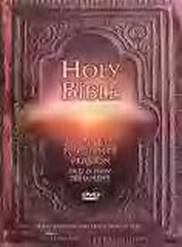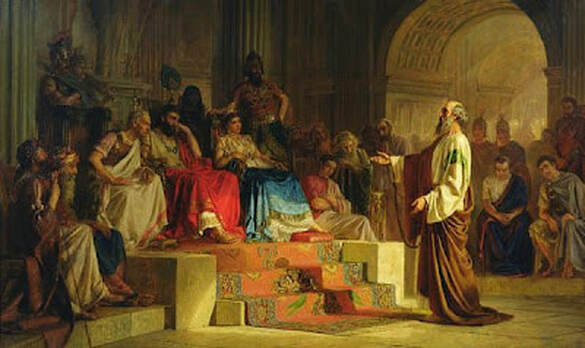Acts 25:13-27
Lesson 278
Read both the "King James Bible" and the "New Living Translation."
In this lesson:
Paul meets the King.
Paul before Festus, King Herod Agrippa, and Bernice.
By the Russian painter and art professor Nikolai Bodarevsky (1850-1921).
By the Russian painter and art professor Nikolai Bodarevsky (1850-1921).
Who were -
King Agrippa -
King Herod Agrippa II was the son of Herod Agrippa I, who killed the apostle James (12:1-2) and was killed by an angel in AD 44 (12:21-23). Agrippa 11's grandfather was Herod Antipas, who mocked Jesus (Luke 23:11) and had John the Baptist beheaded (Matthew 14:6-11). He was also the great-grandson to Herod the Great who tried to kill the infant Jesus (Matthew 2:1-20). His sisters were Drusilla and Bernice, with whom he had an incestuous relationship. Agrippa 11 was born in Rome in AD 27 and died in AD 100 at 73. He was appointed King by the Romans and ruled northeast Palestine. He was Jewish, well versed in Hebrew law and customs, and served as the liaison between Rome and the Jews. Agrippa controlled all Temple affairs, including its treasury, and appointed the Jewish high priests. A prolific builder, he continued the construction programs begun by his great-grandfather, Herod the Great. Agrippa 11 was the last of the Herod dynasty that had governed Palestine for almost one hundred and fifty years. When the Roman army destroyed Jerusalem in AD 70, he and his sister Bernice moved to Rome.
Bernice -
The oldest daughter of King Herod Agrippa I and the sister of King Agrippa II and Drusilla (Governor Felix's wife). After the death of her first husband, Bernice married her uncle Herod, king of Chalcis. They had two sons together. When Herod died in AD 40, she began an incestuous relationship with her brother Agrippa II. She eventually married for the third time but deserted her husband and returned to her brother. When the Roman army destroyed Jerusalem in AD 70, she moved to Rome and became mistress to the Roman Emperor Vespasian and his son Titus.
King Agrippa -
King Herod Agrippa II was the son of Herod Agrippa I, who killed the apostle James (12:1-2) and was killed by an angel in AD 44 (12:21-23). Agrippa 11's grandfather was Herod Antipas, who mocked Jesus (Luke 23:11) and had John the Baptist beheaded (Matthew 14:6-11). He was also the great-grandson to Herod the Great who tried to kill the infant Jesus (Matthew 2:1-20). His sisters were Drusilla and Bernice, with whom he had an incestuous relationship. Agrippa 11 was born in Rome in AD 27 and died in AD 100 at 73. He was appointed King by the Romans and ruled northeast Palestine. He was Jewish, well versed in Hebrew law and customs, and served as the liaison between Rome and the Jews. Agrippa controlled all Temple affairs, including its treasury, and appointed the Jewish high priests. A prolific builder, he continued the construction programs begun by his great-grandfather, Herod the Great. Agrippa 11 was the last of the Herod dynasty that had governed Palestine for almost one hundred and fifty years. When the Roman army destroyed Jerusalem in AD 70, he and his sister Bernice moved to Rome.
Bernice -
The oldest daughter of King Herod Agrippa I and the sister of King Agrippa II and Drusilla (Governor Felix's wife). After the death of her first husband, Bernice married her uncle Herod, king of Chalcis. They had two sons together. When Herod died in AD 40, she began an incestuous relationship with her brother Agrippa II. She eventually married for the third time but deserted her husband and returned to her brother. When the Roman army destroyed Jerusalem in AD 70, she moved to Rome and became mistress to the Roman Emperor Vespasian and his son Titus.
Study Tip:
"In Bible reading, we need to watch ourselves very closely, lest our thoughts wander, and our reading become perfunctory and meaningless. We must determine resolutely to keep our minds on what we are reading, doing our best to form an intelligent conception of it, and being on the lookout for lessons for ourselves."
Henry Hampton Halley, minister and religious writer (1874-1965).
"In Bible reading, we need to watch ourselves very closely, lest our thoughts wander, and our reading become perfunctory and meaningless. We must determine resolutely to keep our minds on what we are reading, doing our best to form an intelligent conception of it, and being on the lookout for lessons for ourselves."
Henry Hampton Halley, minister and religious writer (1874-1965).




